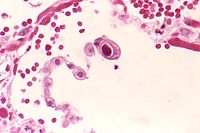
Photo from wikipedia
Conflicting results have been reported regarding the association between early cytomegalovirus (CMV) reactivation and relapse after allogeneic hematopoietic stem cell transplantation (allo-HSCT). This prompted us to evaluate the impact of… Click to show full abstract
Conflicting results have been reported regarding the association between early cytomegalovirus (CMV) reactivation and relapse after allogeneic hematopoietic stem cell transplantation (allo-HSCT). This prompted us to evaluate the impact of CMV reactivation on outcomes of 155 consecutive adult patients transplanted in our institution. In our study, CMV reactivation did not affect cumulative incidence (CI) of relapse in patients with lymphoproliferative disorders. However, the CI of relapse in patients with myeloproliferative disorders (AML and MPN) was 37% (95% CI, 21–53) in patients without CMV reactivation as opposed to 17% (95% CI, 9–28) in patients with CMV reactivation (p = 0.03). An important correlation between CMV reactivation and relapse was found in patients with MPN; the CI of relapse was 50% (95% CI, 12–80) in patients without CMV reactivation as opposed to only 7% (95% CI, 0–27) in patients with CMV reactivation (p = 0.02). A substantial reduction of relapse in myeloproliferative disorders associated with CMV reactivation was confirmed by multivariate analysis (HR 2.73; 95% CI, 1.09–6.82, p = 0.03) using time-dependent covariates for high-risk disease, older age, RIC conditioning, ATG, grade II–IV acute, and chronic GVHD. To our knowledge, we are the first to show an association of CMV reactivation with relapse reduction in MPN patients. This putative virus vs myeloproliferation effect warrants further research.
Journal Title: Bone Marrow Transplantation
Year Published: 2018
Link to full text (if available)
Share on Social Media: Sign Up to like & get
recommendations!